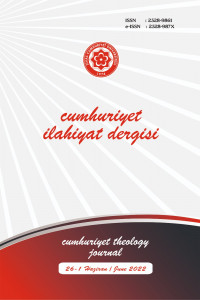İslâm Hukuku ve Antik İbrani Hukukunda Yargıçlık
The Judgeship in Islamic Law and Ancient Hebrew Law
Author(s): Melikşah AydınSubject(s): History of Law, Islam studies, Jewish Thought and Philosophy, Sharia Law
Published by: Cumhuriyet Üniversitesi İlahyat Fakültesi
Keywords: History of Law; Hebrew Law; Islamic Law; Trial; Judge;
Summary/Abstract: Judgeship is one of the oldest professions in history. In the ancient Hebrew law, which is a religious-based legal system, judgeship arose and practised both by the Torah and later by the contributions of judges. In the Written and Oral Torah, which is the main source of Hebrew law, it is mentioned that the other prophets and Moses were authorized both as rulers and judges. Moreover, judges are ordered to make fair judgments on the basis of protecting the weak and without any bribery. We see that there are similar or even the same provisions in Islamic law. In Islamic law, it is seen that both the previous prophets and the last prophet Muhammad carries the authority as the prophet, the ruler and the judge. Moreover, in the Qur'an, judges are ordered to make fairly judgments, avoid bribery, and without favoring any litigants. In this study, the rules of ancient Hebrew law and Islamic law will be compared. Since the subject is limited to judges and courts, first the status and appointment of judges will be explained, then the courts and the trial procedure will be compared, and afterwards the responsibilities of judges and the qualifications required to be appointed as a judge will be discussed. In this respect, the rules in Hebrew law will be compared to Islamic law only in the light of the information given, and the more detailed rules in Islamic law will not be cited because they don’t have equivalents in ancient Hebrew law. As a result, the similarities and differences of these divinely emerging and developing legal systems will be revealed. By examining the history of legal systems, the field of legal history can give an idea of possible changes in today's legal system. Legal systems that have been applied and disappeared in the past and that are out of date can actually be a source for us to develop the law more justly. Hebrew law, perhaps the oldest of those whose sources have reached us from religious-based legal systems, aims to regulate every aspect of a person's life, and it seems to have achieved this goal. Currently, Israel's legal system is not entirely disinvolved from secular and religious law. Due to this purpose of Hebrew law, detailed regulations can be found both in the Torah and the Talmud about court, judge and trial matters. In these regulations, it has been taken place about who will be selected among the people who will conduct the trial, the rules that the judges should follow while conducting the trial, the types of courts and many other issues. The compared aspect of Islamic law; is that Islamic law is also based on religion. Islamic law also makes regulations in every aspect of a person's life. And in the field of judicial law there are perhaps more rules than the regulations in Hebrew law. It is seen that many rules of Islamic law and Ancient Hebrew law are similar in the subjects on which the study is limited. In fact, the decomposing points are only on one or two issues. In Islamic law, it is seen that some rules in previous legal systems are preserved exactly. In this respect, Islamic law did not abolish all of the rules of the previous legal systems, but took some of the same rules and changed some of them. In particular, the rules that judges have to follow while continuing their judicial activities are almost the same in Ancient Hebrew law and Islamic law. It should be noted that there are additionally more detailed rules in Islamic law. This situation has led to the determination of the qualifications such as justice, impartiality, knowledge and education, which should be found in a judge who must conduct a trial fairly. It will be seen that the rules of thousands of years ago have not changed even today. It will be understood that the regulations in the Bangalore Principles of Judicial Conduct and in the domestic laws of the countries are not very different.
Journal: Cumhuriyet İlahiyat Dergisi
- Issue Year: 26/2022
- Issue No: 1
- Page Range: 451-467
- Page Count: 17
- Language: Turkish

